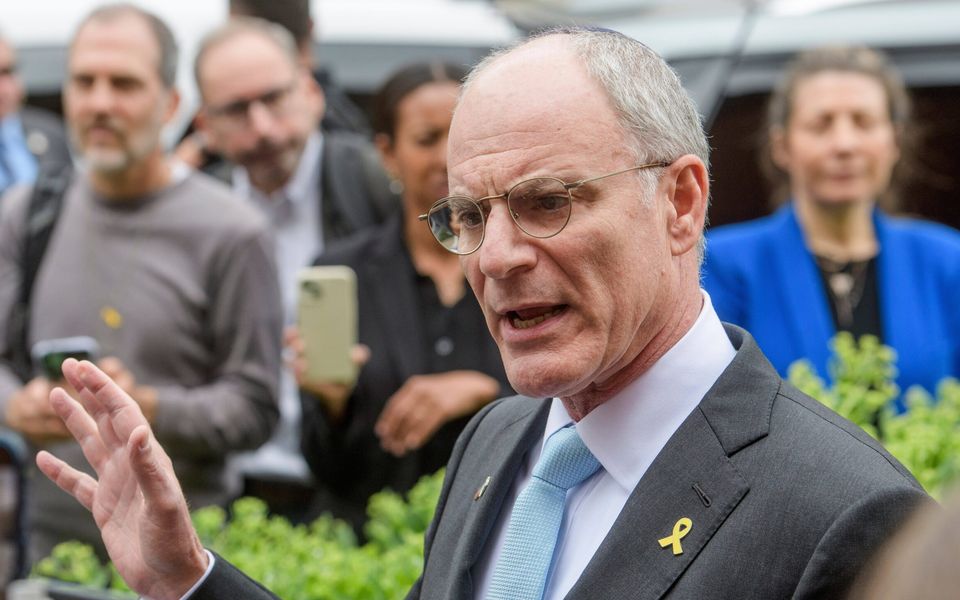Elon Musk’s attacks on a group long backed by the GOP prompt Republican shrugs
One of Elon Musk’s latest targets is a nonprofit dedicated to bolstering democracy overseas that has long been a darling of the GOP. Yet prominent Republicans with ties to the group — including a lawmaker who serves on its board — are staying conspicuously silent.
Musk, in recent posts on X, has demonized the National Endowment for Democracy — a 41-year-old organization rooted in efforts to counter communism that provides grants to democracy and civil society groups abroad — is “rife with corruption” and guilty of unspecified “crimes.” He posted in early February that the “evil organization needs to be dissolved.”
The group has since been unable to access its funding from the Treasury Department, and organizations it supports have begun laying off staff.
Elon Musk denies orchestrating ‘hostile takeover’ of governmentShare
NED informed organizations that depend on its financial support Wednesday that it will cease payments to them immediately because it can’t access its congressional funding. “Once you run out of money, consider your agreement with our organization suspended,” NED said in the statement, which was obtained by POLITICO.
The democracy organization is one of dozens of groups that Musk has gone after in recent weeks, but it is notable because it has long had support from the Republican establishment. And while the Trump administration’s cost-cutting is often framed as a downsizing of a bureaucracy bloated by reckless Democratic Party spending, NED’s crisis shows it is hitting institutions beloved by Republicans, without much pushback.
Congress created the organization in 1983 as part of a wider effort under President Ronald Reagan to fight the spread of communism. It is bipartisan but is notable for the extent to which the Republican establishment has long backed it. Sen. Todd Young (R-Ind.) is a board member. Its current chair is former Rep. Peter Roskam (R-Ill.), and its vice chair is Stephen Biegun, former deputy secretary of State in the first Trump administration. Rep. Elise Stefanik (R-N.Y.), Trump’s U.N. ambassador nominee, is a former board member.
Young declined to comment, and neither Biegun nor Stefanik responded to requests for comment. Roskam declined to comment on Musk’s allegations but called the group a “disciplined, cost-effective foundation” that does work “critical to American interests in a dangerous world.”
NED board member Daniel Fried, who served in the National Security Council in both the Clinton and George W. Bush administrations, said the group is getting unfairly painted with a partisan brush.
“The notion that NED is a bastion of woke would come as a great surprise to the Reaganites who backed it,” said Fried, who also served as a foreign service officer. The history of “Trump veterans” including Stefanik and former national security adviser Robert O’Brien as NED board members should demonstrate that its funding is neither “a luxury or a waste,” Fried added. (O’Brien didn’t respond to a request for comment.)

One of the group’s main grantees is the International Republican Institute, a 42-year-old organization whose activities include election monitoring in foreign countries and supporting anti-corruption efforts overseas. Its board includes eight current or former GOP lawmakers.
Musk targeted Young directly in his online campaign against the organization. In an X post last week, he accused Young of being a ”deep state puppet” for serving as an NED board member. Musk deleted the tweet within hours and followed with a post that said Young “will be a great ally in restoring power to the people from the vast, unelected bureaucracy.”
Asked to respond to Musk’s tweet, Young’s office said in a statement that the senator and Musk later had “a great conversation” about DOGE, without providing further details.
Musk said in a tweet that he’s a “fan” of Stefanik, a former board member, while at the same time stressing his larger point that “anyone with integrity needs to resign from NED.”
Musk didn’t respond to a request for comment.
Democrats are furious that the group’s Republican backers aren’t taking a stand for the organization.
They should “push back before President Trump’s allies undermine one of our most powerful tools for supporting freedom around the world,” said board member Rep. Joaquin Castro (D-Texas).
The bulk of the organization’s annual budget of around $300 million goes to programs in Russia, China, Ukraine, North Korea and Cuba.
Its work in China has included assistance to activists and organizations involved in human rights monitoring and rule of law initiatives as well as support for Tibetan and Uyghur communities facing Chinese repression. The democracy group has also bankrolled education programs for African and Latin American groups on identifying and countering malign Chinese influence in those regions.
Beijing has waged a yearslong campaign demonizing the organization as a covert arm of U.S. intelligence agencies that seeks to destabilize the Chinese government by funding human rights and pro-democracy groups. Chinese Embassy spokesperson Liu Pengyu declined to comment on Musk’s social media posts but called the group a threat to “world peace and stability.”
NED rejected Musk’s accusations as baseless.
“I’m not sure how much he actually knows about [NED],” the group’s President Damon Wilson said of Musk. Still, Wilson stressed that the organization welcomes scrutiny of how American taxpayer money is spent. “We’re not imposing democracy on people who don’t want it,” he said, “We’re giving lift to people who are fighting the battle.”
Wilson said Musk hasn’t contacted the group, but it’s already working toward becoming more “cost effective” in its operations.
Still, its operations are grinding to a halt as the group begins furloughing staff due to a lack of cash.
As of Friday, NED was unable to access its operational funding held at the Treasury Department, according to a person familiar with the group’s financing, who was granted anonymity because they weren’t authorized to speak publicly about the funding situation.
While the reason for the funding halt was not immediately clear, it could be because NED receives a fraction of its funding — roughly 5 percent of its operating budget — from the State Foreign Operations Democracy Fund, which falls under a foreign aid funding freeze that President Donald Trump ordered last month. The remaining 95 percent of NED’s budget comes from sources outside of those hit by the funding stoppage.
“For reasons that remain unclear, NED currently does not have access to these funds,” said a spokesperson for the group granted anonymity because they weren’t authorized to speak publicly about the group’s funding problems.
Neither the White House nor the Treasury Department responded to requests for comment.
Three of the four groups through which NED funnels the bulk of its funds have already started laying off or furloughing staff due to concerns about the reliability of NED funding. All four organizations also receive a portion of funding from both USAID and the State Department.
The Center for International Private Enterprise, which works with the private sector in foreign countries to fight corruption and expand business opportunities for women and minorities, started layoffs and furloughs last week, according to a person familiar with its staffing situation granted anonymity because they weren’t authorized to speak on record.
The International Republican Institute, where Marco Rubio was a board member prior to becoming secretary of State last month, has furloughed two thirds of its workforce and closed more than 20 of its overseas offices, according to a person familiar with IRI operations granted anonymity because they weren’t authorized to discuss internal staffing issues.
The State Department didn’t respond to a request for Rubio’s views on IRI’s funding cuts.
The NED-funded National Democratic Institute — which does similar work to IRI and is loosely affiliated with the Democratic Party — said Wednesday that it’s making similar cuts to its workforce and operations.
Not all Republicans have a rosy view of NED.
“I would be happy to see it on the DOGE chopping block,” said Sen. Mike Lee (R-Utah), a member of the Senate’s DOGE Caucus. NED is “yet another politicized NGO meddling in the affairs of our friends and allies regardless of what’s best for the American people,” he added.
But cutting NED’s funding carries political risk by raising questions about the Trump administration’s touted tough-on-China foreign policy. The initiatives it funds include labor rights education and monitoring in Chinese factories, and groups that work to combat Chinese government propaganda.
The closure of such organizations would be “a gift to dictators and authoritarians around the world,” said Tom Kellogg, executive director of Georgetown University’s Center for Asian Law, who has worked with NED-funded Chinese activists for more than two decades.


